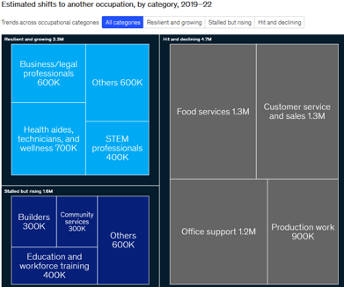
Gender, University, AI and Employment
04/06/2024
We’ve been taking a look at some very interesting stats about the intersection of gender, academia, work and AI. The results? Let’s take a look…
A recent article from FRED highlighted that we’ve reached the point where women are the majority of college educated workers in the US.
Given the working population of adults over 25:

Key:
- Purple - % men working not college educated
- Green - % women working not college educated
- Red - % men college educated working
- Blue - % women college educated working
McKinsey is saying that the movement over that time is out of customer service sales and office support. They say the areas people are moving into are business and legal professions, STEM professionals, health aides/technicians and roles like lorry or bus drivers. I’m not sure I fully agree with the automation estimates in the article, given they’re saying builders’ jobs are more automatable than customer service and sales, but the movement numbers strike me as a little truer to life.

Then you see companies like Klarna using AI to do 700/60% employees worth of work on their customer services. So, I can see why people would be abandoning office support and customer services.
Given advancements in voice capabilities, even OpenAI are now telling companies like banks that voice is no longer safe to use as an authentication method. Even though GPT was text only 12 months ago, and the newer GPT models are poised to be able to accept pictures, audio, and text within the next three months (possibly delayed due to the concerns if you could ask GPT 5 to clone someone’s voice from a phone call).
We’re now in a world where wondercraft.ai is creating podcasts from the top ten posts on hacker news as a proof of concept available here. I’m sure it would be easy enough to turn your unread emails into a podcast if the desire possessed you (I won’t, my emails are all AI conference adverts) but that personal AI Assistant feels like it’s not too far in the future.
So, data summarization and querying with audio/video input/output is now within the realm of possibility and replacing customer service staff or making passible podcasts. While companies are overselling AI capabilities in areas like software development, with the unravelling of claims like those of devin.ai and known issues of GPT hallucinations in law, that doesn’t mean the entire thing can be written off as a complete flash in the pan.
When looking at which jobs are likely to see substantial cutbacks, I then started to question who would be on the receiving end of these cuts? One thing started to jump out at me: the gender split.
There are many jobs that are focused on the organisation and prioritisation of data, something AI is seen as fairly good at.
- Paralegals? 80% female.
- Teachers/Tutors? 75% female.
- Marketing? 69% female.
- Journalism? 60% male.
- Social media? About equal.
- Clerks? 80% female.
- Secretaries and other assistants? 80% women.
- GP (58% male), could I replace you with a nurse (80% female) and a RAG LLM?
- HR Managers? 76% women.
- Financial analysts? The reading of the news and guessing the related stock movements? 50% women at entry levels.
- Programmers? 92% male.
This could end up being nothing, but to me, it does seem like women with degrees are most likely to be hit with these improvements to automation with generative AI. Plus, the trends would suggest that there will be more women with degrees than not soon. This could become a bigger issue before we know it. I don’t think AI can fully replace any of these job roles, because they all heavily rely on a human element and interpersonal connections. But equally, with management chasing cost savings, I would definitely be a bit worried about them trying.
What do you think?